In a little over two weeks, on June 14, the 21st FIFA World Cup games will get underway in Russia. In the first round, Iran’s National Football team faces Morocco and two of the most mighty football teams in the world — Portugal and Spain.
To gain an understanding of Iran’s past performances at FIFA World Cup championships, and of its chances at the forthcoming one, IranWire spoke to Iranian football star Khodadad Azizi, who was known by the nickname the "speedy gazelle of Iran” during his career. Azizi played 47 games for Iran’s National Football team, and scored 11 goals. It was Azizi’s goal against Australia in November 1997 that qualified Iran for the 1998 World Cup in France.
After retiring, Azizi went into coaching. But he has remained outspoken, critical, frank — and often a little harsh on the coaches with whom he had worked. IranWire talked to him about the team's famous victory over the United States in 1998, the strength of the national team throughout World Cup championships, and his hope for this year's tournament.
It has been 20 years since Iran’s first and last World Cup victory, when it defeated the US team at the 1998 FIFA World Cup. Isn’t there more to this victory than just winning? The motivation and energy of the team really stood out, didn't it?
Two decades! Yes, it is really a long time.
I believe that Iranians have sound judgment about the quality of their football generations. That generation was the best in Iranian football. I don’t say that because I was part of that generation. But you tell me how impressive a team was that had Ahmad Reza Abedzadeh as goalkeeper, and also had Mohammad Khakpour, Nader Mohammad-Khani, Hamid Estili, Mehdi Mahdavikia and Ali Daei. I always said that Abedzadeh was a whole team all by himself. He had everything. I do not want to compare the 1998 team with today’s team too much, but I can say that, person by person, it was a better team.
But it did not have the experience of today’s team — neither in terms of working with high-level coaches for an extended period of time, nor in terms of training camps, and not even in the number of the team members who had played in Europe.
But it had courage. We were a daring team. No, I am not saying that today’s team is a cowardly one. As it happens, Carlos Queiroz [the head coach of Iran’s National Football’s Team] has built a good team, and he believes in it as well.
And this daringness increased before playing against the American team. Perhaps it was part audacity and part anxiety and stress — something that could be seen on the faces of some Iranian players and coaches, at least in the photographs taken before the game. The night before the match, this mood must have been palpable at the hotel, too.
No, stress was not the dominant mood. I am not saying that it was a night like every other night, but the atmosphere was not an atmosphere of fear. [Football Federation President Mohsen Safaei] Farahani talked a bit. So did the coaches. Then the players exchanged jokes and fooled around. We broke the somber mood.
There has been a lot of talk about that team. Some said that we were ganging up against each other and some [of the players] had problems with others and did not talk to each other. Look, there are differences in all families and in every work environment, but the important thing is that when we were about to play against the US, the mood changed. Perhaps this is what made the game with the Americans so special.
Did you receive special instructions before the game? In 2014, Safaei Farahani said that before the US-Iran game there were concerns, and that he did his best to shield you from messages, suggestions and even political counsel coming from Tehran. Many might have wanted to advise you. Sports was not the only aspect of the US-Iran game.
Not at all! We “advised” ourselves to defend Iran’s prestige. I remember we were not even advised what to do after we scored a goal — how to cheer, where to go, with whom to shake hands or not shake hands. Perhaps they did want to advise us but we did not hear about it. The truth is that we were absolutely calm when we went to the stadium.
You said that that team was part of the “golden generation” of Iran. And that team achieved the only victory for Iran at the World Cup. But let us look at it from another angle. If Carlos Queiroz — or, at least, somebody similar to Queiroz in terms of experience and talent — was coaching the 1998 game, would we have come back with two losses and one tie?
The answer cannot be a simple yes or no. We have to look at the games individually.
In the first game, Yugoslavia scored a goal against us because of the mistake of one player. We won the second game. But what still pains me is our game with Germany. Around the middle of the second half, Ali Daei told me: “go and tell the defensive line to move forward. Why is the team is playing so much to the back?” I went and told Nader [Mohammad-Khani] and Mohammad Khakpour to go forward. And a few times both Ali Daei and I shouted or waved our hands to ask Mehdi Pashazadeh and Javad Zarincheh to move the team forward, but it was no use. Afterward we were told that “losing 2-0 is better than losing 4-0.” This is the kind of advice that you were talking about.
I talked about the “daringness” of the 1998 team. That team came up with its own daring. It was not something that was injected by the coaches. But more important than anything else is that today’s Iranian team believes in itself. Queiroz might put the team in a defensive position but he has never told a player: “don’t go forward because you might concede a third goal.” I disagreed on many things with Queiroz and still do. But the fact is that if we had somebody like Queiroz in France [the host of the 1998 World Cup], we would have defeated Germany as well. We did not lose to Germany, but we had lost to ourselves before the game started.
Is it true that that before playing Germany, the football federation had reserved return tickets to Tehran for the players?
[After a pause:] I don’t remember. What I know is that after playing against the US, it was all over.
In other words, you believe that today’s team is better than the 1998 generation team because of Queiroz?
No, you should not get the impression that I want to sum up the whole team around its coach. Today, we have more Iranian footballers who play for European leagues. The national team also plays more preparatory and friendly games. All in all, Queiroz has a more experienced team. One 24-year-old has the experience of 24 national games and 80 games with European clubs. What better [team] could a head coach hope for? Of course, one cannot ignore his effect on the team. For years and years we had a big problem called “team defense.” Well, now Queiroz has solved this problem.
But this is a 180-degree turn in your view of Queiroz. You were always a serious critic of him.
I am not a critic of him, but I expect things from him. We got to the World Cup with Heshmat Mohajerani [the manager of Iran’s National Football Team during the 1998 FIFA World Cup championship in France]. [Mohammad Mayeli] Kohan was also one step away from France. Branko Ivanković got his team to [the 2006] World Cup [in Germany] but the team did not climb out of its group. We have brought in Queiroz so we can climb. Otherwise, getting to the World Cup is no longer a wish or a dream for Iran.
How realistic is the expectation that in Russia this year we can advance against Portugal, Spain and Morocco, the other three countries in Group B with Iran? In the history of our football, we have had only one victory at the World Cup. Spain has been the world champion twice and Portugal is the European champion.
We have to think about what we are today. Our problem has always been defense. Otherwise, Iranian football has always had the best strikers in Asia and we still have good strikers. When you talk about great teams, you must also take into account the characteristics of the national team over the last four years. This team got to the World Cup with the best defense line.
Everybody is talking about the first game against Morocco. And I think that playing against Morocco is going to be our most difficult game. In the [2014] World Cup in Brazil, we harassed Argentina more than any other team. This time around, too, Portugal and Spain will have more trouble from us than from Morocco.
I’m glad you mentioned that. In 2006 we were also in the same group as Portugal. Before the game you had said that Iran would not get into Portugal’s penalty zone even twice. But, of course, it got there twice, and only twice. So it’s interesting that you say we should expect Queiroz’s team to do well against the Portuguese.
I do not expect this only from the game against Portugal. We must climb out from our group. And it is really not a question of “must.” We can climb. This team has a much better potential for rising from the group than the 2006 team did.
Don’t such high expectations before the start of the World Cup games mean that, in the case where Iran is defeated and eliminated in the first round you will have a better chance for criticism?
No. I always criticize whomever I want. [He laughs] And I don’t need Queiroz winning or losing in the World Cup to do it.
visit the accountability section
In this section of Iran Wire, you can contact the officials and launch your campaign for various problems




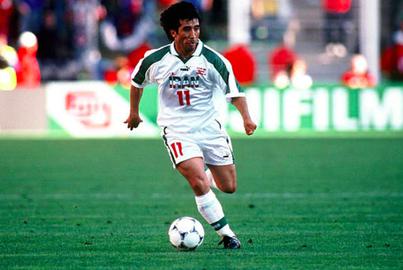
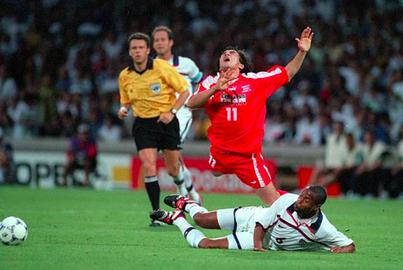
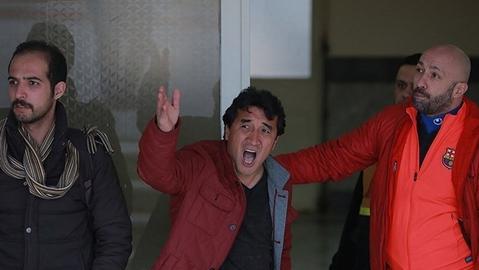
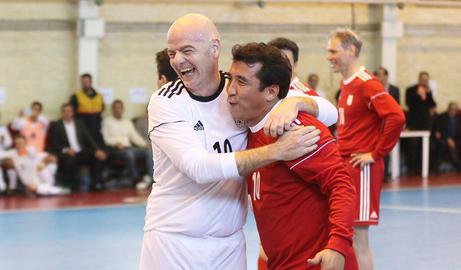



















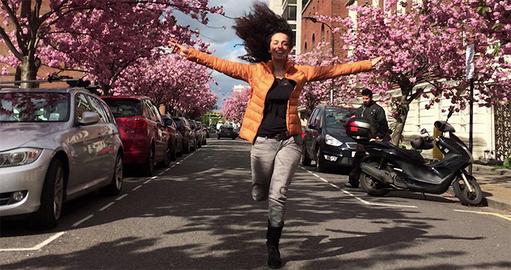
comments